Search results for "Aseguranzas para autos Pompano Beach FL llama ahora al 888-430-8975 Calcular valor de seguro automotor Buscador seguros auto La caja de seguros automotor Asegurar mi auto online Seguro basico para auto Corredor de seguros"
Cause of death
30 June 1999 | Archives online, Fiction, Prose
A short story from Åtta kroppar (‘Eight bodies’, Söderströms, 1998). Introduction by Ann-Christine Snickars
It was a bailer, a blue one. There they were, he, she, the bailer and a stormtossed net on the stern board of a hired boat. The boat had come with the cottage and the cottage with ‘Autumn archipelago package. Now nature is aglow.’
And it was aglow.
Masses of foliage and apples, damson and shiny russula spread out around them in all their glory. It happened everywhere, that glowing. Wherever one turned one’s gaze there was something ready to be picked or ready to fall, ready in general. Those first days they had, at least to each other, she to him, feigned enthusiasm about all this ripe richness, but that time was over.
Their time of fire and flames was over. More…
New from the archives
11 May 2015 | This 'n' that
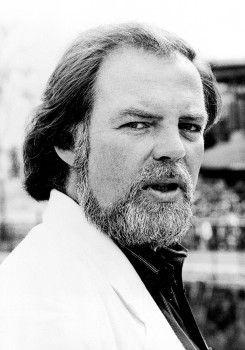
Juhani Peltonen. Photo: C-G Hagström / WSOY.
This week’s pick is, like last week’s, a period piece – this time a cry for help from the 1980s in the work of Juhani Peltonen (1941-1998).
Like Runar Schildt’s short story Raketen, written shortly before Finland gained independence from Russia and was almost immediately plunged into civil war, these pieces by the multitalented Juhani Peltonen, who wrote plays for stage and radio as well as short stories, novels and poems, were published shortly before major and irrevocable change.
In the short story ‘The Blinking Doll’, we are a year short of the fall of the Berlin Wall, and it seems as if things are never going to change. We follow two forty-year-old lawyers, Juutinen and Multikka, as they trudge along the beach in one of the charming resort towns of the west coast in which they have spent a couple of days dealing with a minor felony case.
They’re both forty, and divorced, disillusioned with their jobs and with the world; and both are infatuated with one of their colleagues, a woman whom they call ‘The Blinking Doll’.
There is, Peltonen says, a ‘pact of friendship and mutual assistance between the men’ – a jocular reference to the notorious treaty of 1948 in which Finland was obliged to resist attacks on the Soviet Union through its territory, and to ask for Soviet aid if necessary. In 1988, this seemed as if it were written in stone – and the men’s emotional lives are similarly petrified. They discuss their isolation, their lack of purpose, their inexplicable weeping fits. The most painful thing, says Multikka, is love; or, says Juutinen, and which comes to the same thing, the lack of it.
As Erkka Lehtola, our then Editor-in-Chief, remarks in his introduction, Peltonen – Finnish literature’s best-known comi-tragedian, he calls him – focuses on the difficulty of loving in a violent, mechanical, oppressed world. Is it the passage of twenty-five years that imbues his writing with such a poignant sense of stasis and futility? There is a sense of desperation, barely controlled. As one of his poems has it,
Too abundant in the course of the evening
Cries for help from the heart of stifled detail, legato.
![]()
The Books from Finland digitisation project continues, with a total of 388 articles and book extracts made available on our website so far. Each week, we bring a newly digitised text to your attention.
Poems
31 December 1977 | Archives online, Fiction, poetry
Poems from Tanssilattia vuorella (’The dancing-floor on the mountain’). Introduction by Pekka Tarkka
I
Having studied
Krinagoras
the flower of Philippos’ wreath
under the vaults in a cool library far away in silence
I have gone to see the boat how it is coming on
whether it will be in working order next summer
we have no strong men
have sat on the beach-hut steps thinking of him
the politician the negotiator:
poetry is a holding of council, an art of negotiation More…
Autumn’s child
17 November 2011 | Fiction, Prose
Extracts from Bo Carpelan’s novel Blad ur höstens arkiv. Tomas Skarfelts anteckningar (‘Leaves from autumn’s archive. The notes of Tomas Skarfelt’). Introduction by Clas Zilliacus
When I took my first walk here in Udda, along the road down to the end of the bay, my legs wanted to go left up to the forest, while I strove to walk straight ahead. It was an unsteadiness reminiscent of being slightly drunk. A slight vertigo I have already noticed before. Trees soughed through me and the water of the bay tasted almost like salt on my lips. All sorts of things try to pass straight through me nowadays. I am becoming a general store. The few people I know go there and choose, and I try to sell. Most of it is old memories with attendant dust. They are in no chronological order at all, and make involuntary, rapid leaps, like kangaroos. Even when I went to school they hopped around. They forced me to learn my lessons by heart. They continued to skip over me at university and added an extra complexity to my studies in general history: concentrate of reign lengths.
And if I followed my legs and gave not a damn about my dead straight road? Digressions from what was planned provided me later on with my best experiences, and coincidences were grains of gold. Improvisations were lucky throws, or disasters. Afterwards came the restrictions, the constructions, the architecture. Now only that squared-paper notebook remains with its pitfalls. The uncertainty is sometimes imperceptible, but is there: Am I not superfluous? Are not my legs somewhat irrational? More…
Upstairs, downstairs
31 March 2000 | Archives online, Fiction, Prose
From Harmia lämpöpatterista (‘Trouble with the radiator’, Gummerus, 1999). Introduction by Tero Liukkonen
The view
From here, I can see straight into their bedroom. The thin man chases the red-haired mountain of lard; round and round the room they go: the man is swinging something in his hand, I can’t see what, while the lard-mountain squeals until the man throws her onto the bed. The same thing happens every night; I can’t see the bed. Too low, and I wouldn’t want to, besides; lewd ugly makes me sick that I can even think of it.
Downstairs a young man is always watching TV, sitting there motionless all evening. The blue flickers, never turns on the light, a young man. He has long, slender legs and arms, but his face I can’t see, it’s too dark. There are painting tools on his window sill. More…
For the love of a city
31 December 2004 | Archives online, Fiction, Prose
Extracts from the novel I väntan på en jordbävning (‘Waiting for an earthquake’, Söderströms, 2004). Introduction by Petter Lindberg
Nonna Rozenberg lived quite near the special school where I was a boarder, in a block nine stories high with a bas-relief to the right of the door. This bas-relief featured a fairy-tale figure – the Firebird or the Bird Sirin.
I often saw Nonna stepping out of a tram carrying a large brown case. She moved carefully, as if afraid of falling.
She played the cello, and resembled that bulky, melodious instrument herself. Women’s figures are often compared to guitars. But Nonna’s appearance never hinted at parties at home with parents away or singsongs around the camp-fire.
She was no beauty. Her slow, precociously mature body was neither graceful nor girlishly delicate. If I’d met her later, when I was working at a gym, I’d have said she was overweight and lacking in self-discipline. More…
The mistake
30 September 2008 | Archives online, Fiction, Prose
A short story (‘Erehdys’, 1956, last published in the collection Lukittu laatikko ja muita kertomuksia, ‘A locked box and other stories’, WSOY, 2003). Introduction by Markéta Hejkalová
My feet are smarter than my head. On an April night in Naples they carried me along the Via Roma past the royal palace and the giant illuminated dome of the church. The people of Naples walked up and down the immortal street like the cool of evening, looking at each other and at the brightly lit display windows. I had nothing against that, but at the comer of Via San Brigida my feet turned to the right. The snow-cold breath of my homeland radiated toward me from Saint Bridget Street.
When I had turned the corner I could see a restaurant window still lit, with its fruit baskets, dead fish and red lobsters. The most hurried diners had already finished their meals. I stepped into the long dining room of the restaurant, the sawdust on the floor stuck to my shoes, a frighteningly icy stare pierced me from behind the counter, but I gathered my courage and whispered bravely, ‘Buona sera, signora.’ More…
When the viewer vanishes
26 May 2015 | Essays, Non-fiction
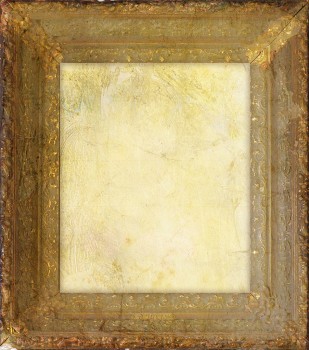 For the author Leena Krohn, there is no philosophy of art without moral philosophy
For the author Leena Krohn, there is no philosophy of art without moral philosophy
I lightheartedly promised to explain the foundations of my aesthetics without thinking at any great length about what is my very own that could be called aesthetics. Now I am forced to think about it. The foundations of my possible aesthetics – like those of all aesthetics – lie of course somewhere quite different from aesthetics itself. They lie in human consciousnesses and language, with all the associated indefiniteness.
It is my belief that we do not live in reality, but in metareality. The first virtual world, the simulated Pretend-land is inherent in us.
It is the human consciousness, spun by our own brains, which is shared by everyone belonging to this species. Thus it can be called a shared dream, as indeed I have done. More…
Writes of passage
20 June 2013 | This 'n' that
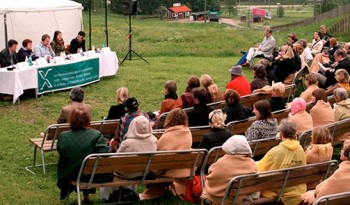
Debating the word: participants at the Lahti Reunion. Photo: LIWRE
The 26th Lahti International Writers’ Reunion took place at Messilä Manor (some 120 km from Helsinki, on Lake Vesijärvi) from 15 to 18 June.
Chaired by Virpi Hämeen-Anttila and Joni Pyysalo, writers from more than 20 countries held discussions in Finnish, English and French.
This summer the theme was ‘Breaking walls’. ‘Problems demand answers, answers demand questions. If attitudes harden, arms talk, and everyone erects a wall around himself, where is literature in the equation? Is the highest wall right there inside the writer? Or is literature itself a protecting wall? What happens when walls break down?’
The first Writers’ Reunion took place in Lahti – first at Mukkula Manor – fifty years ago; more than a thousand writers, translators, critics and other professionals both Finnish and foreign have come to Lahti to discuss writing. The Reunion has always been open to the public as well.
The biannual Reunion began life in 1963, during the Cold War. Writers from both sides of the Iron Curtain met under the oaks of Mukkula. In the Reunion’s blog some participants and organisers share their experiences of the past; here, the meeting’s one-time international secretary Marianne Bargum recalls the late 1970s and early 1980s:
‘…following in the footsteps of the legendary publisher Erkki Reenpää who knew everybody and all languages, I did my best to persuade big stars to come to Mukkula. Some writers had difficulties when they realised that they were not as well known in Finland as in their own countries. The French poet Michel Deguy left after one day, very offended when nobody knew how big a name he was. (I met him in Paris some years later and he apologised.)
A scandal with huge political consequences came close when the French philosopher Bernard-Henry Lévy said some derogatory things about the Soviet head of state Brezhnev. The Russian delegate, Michael Baryshev, threatened to leave the conference, and Valentina Morozova, interpreter and politruk, had to phone the Soviet Embassy in Helsinki and explain that this was not very serious. The famous British critic and writer Al Alvarez did his best to calm down the antagonists in a panel.’
My own first personal experiences of this international fête (which could mean either wading in the mud on the way to the huge tent sheltering the discussions or basking in hot sunshine followed by the most gentle nightless nights), from the sunny summer of 1983: interviewing Salman Rushdie and Jayne Anne Phillips, among others, for the Finnish Broadcasting Company. Another time the bag containing some hundred copies of the latest issue of Books from Finland, fresh from the printing press, sat on a bus heading for Lahti while I sat on the one behind – which then broke down in the middle of the road, and this was before mobile phones. The driver did have a radio phone though, and the participants got their copies in time.

Soccer on the sand: Messilä beach. Photo: LIWRE
Among the traditions is a midnight football match between Finns and foreigners: the summer night is light and long. This time the result of the Finland against the rest of the world was convincing 6-3 to Finland.
A roof with a view
27 August 2009 | Fiction, Prose
Extracts from the novel Mistä on mustat tytöt tehty? (‘What are black girls made of?’, Tammi, 2009) Introduction by Tuomas Juntunen
I’m a chimney sweep’s daughter, born October 1962 as a gift, a light to a darkened world. I’ve had lots of mothers, but none of them ever stuck around for good. One of them gave birth to me, so she’s Mother, not mother. Her name is Dewdrop, because water has spilled over the only photograph of My Mother and now her face has dissolved into a single translucent droplet; her nose, cheeks and chin are now a fat, shiny blob that looks like it’s about to fall out of the bottom of the picture. More…
Worlds apart
18 June 2009 | Extracts, Non-fiction
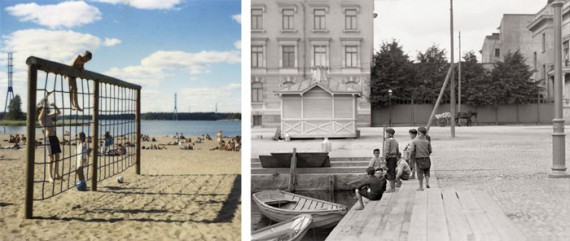
Helsinki boys by the sea: in Martti Jämsä’s Polaroid lads play on the beach; in I.K. Inha’s photograph (Hietalahden satama, ‘Hietalahti harbour’), taken a century earlier, barefoot urchins meet up on the quayside
A hundred years ago the photographer I.K. Inha (1865–1930) was asked to illustrate a tourist guide to Helsinki. He took some 200 photographs, of which some 60 were included in the book, which was published by WSOY in 1910. In his new book of photographs, OPS! Helsinki Polaroid¹, Martti Jämsä (born 1959), wanders the same streets a century on, taking snapshots with his Polaroid camera. More…
Sun and shade
3 August 2011 | Extracts, Non-fiction
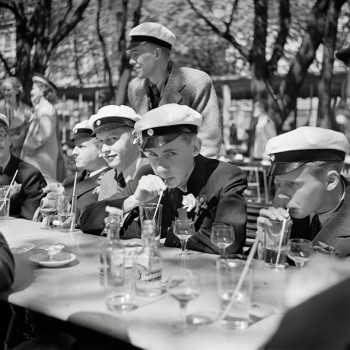
Springtime: the new graduates celebrate the beginning of summer. Photos: ©Jussi Brofeldt
Documentary film-making and photography arrived in Finland in the 1920s with pioneers like Heikki Aho and Björn Soldan, who founded a film company in 1925 in Helsinki. They also took thousands of photographs of their city; in a selection taken in the turbulent 1930s, people go on about their lives, rain or shine
Photographs from Aho & Soldan: Kaupunkilaiselämää – Stadsliv – City life. Näkymiä 1930-luvun Helsinkiin (‘Views of Helsinki of the 1930s’, WSOY, 2011)
Photos: Aho & Soldan@Jussi Brofeldt. Texts, by Jörn Donner and Ilkka Kippola, are published in Finnish, Swedish and English.
The exhibition ‘City life‘ is open at Virka Gallery of the Helsinki City Hall from 1 June to 4 September.
Aho and Soldan were half-brothers, Heikki the eldest son of the writer Juhani Aho (1861–1921; an extract from one of his novels is available here) and the artist Venny Soldan-Brofeldt. (Juhani Aho changed his original Swedish surname, Brofeldt, to Aho in 1907), Björn Soldan was Aho’s son from an extramarital relationship. More…
Mother-loves
31 March 1994 | Archives online, Fiction, Prose
Extracts from the novel Ihon aika (‘The time of the skin’, WSOY, 1993). Introduction by Suvi Ahola
In the hospital they stare at us, enquiringly, as if we are abandoning her. They look in turn at our mother’s half-conscious, ulcerous body, at the nurse who, curling her lip, cuts mother’s knickers, housecoat and apron off her, at us, the exhausted ones, who are now only at the beginning of our real work. They fill in their forms and ask their official questions; they do not know how anguished and relieved we shall be in a moment when we may leave our mother to them, that ironically smiling, wounded woman who is still, with her last strength, attempting to kick the nurse who is pouring warm water on her bloody feet.
I gaze at mother’s battered body with something like greed; I feel the same kind of curiosity toward this shocking sight as when I was four and we were in the bathroom together. I was shy, I tried to spy on mother’s fleshy body, her luxuriantly curving skin, through the mirror, but I was always left with the feeling that I had seen too little, I had been able to understand only a small part of what my eyes had registered. More…
Summer madness
27 June 2012 | Non-fiction, Tales of a journalist

Illustration: Joonas Väänänen
In the endlessly long days of the brief Nordic summer, what could be better than to go on a bender? Jyrki Lehtola explores a quaint Finnish custom
In Finland it’s cold and dark for nine months of the year. We spend the other three months drunkenly praying that tomorrow it might be warmer and lighter – and sometimes it is.
From the perspective of the national psyche, you’d think we might have learnt to live with the cold and the dark. We might have dealt with it and turned it into something useful to us and to our continued survival. Sadly though, this isn’t quite the case. For nine months we sit indoors staring at the television, complaining that there’s never anything worth watching and waiting for those three months to come so that we can go outside again.
And when we finally get outside, we go mad. No longer are we a silent, anxious people. Well, we are, but we pretend we’re a different kind of people: one that spends its time chattering joyfully on the beach, dancing, enjoying life, discussing, debating, participating, sharing.
The arrival of summer makes us go mad. By the end of June, this silent, anxious, suicidal nation has turned into the number one samba carnival of Northern Europe. More…
The fox and the bear
30 December 2008 | Children's books, Fiction
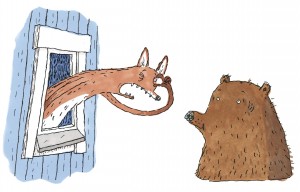
A story from the children’s book Sorsa norsun räätälinä (‘The mallard as tailor to the elephant’, Otava, 2008; illustrated by Christel Rönns. Introduction by Päivi Heikkilä-Halttunen
Back in the days when mallard still had horns, earthworms, claws, and the bear had a long tail, a bear was trudging dejectedly along the road.
Up drove a fox in his van, studded tires crunching, for it was winter and freezing cold. The fox was coming from fishing and his van was bursting with fresh fish. When he saw the bear, the fox stopped, rolled down the window and called, ‘Why hi there, old honey snout! Where’re you coming from?’
‘I was playing cards at Badger’s. I lost all my money and now I’m starving,’ the bear replied.
‘Jump in. No need to suffer in the grip of this cold,’ the fox said. The fox and the bear were good friends. However, the fox envied the bear, because Mr Honeypaws had a much longer, more handsome tail than the fox did. The bear clambered into the fox’s car and saw the enormous catch of fish.
‘Wherever did you get such an incredible amount of fish?’ the bear marvelled.
‘The lake. That’s where you get fish,’ the fox replied. ‘Last week I caught such a big pike that I made snow shovels out of its scales.’ More…
